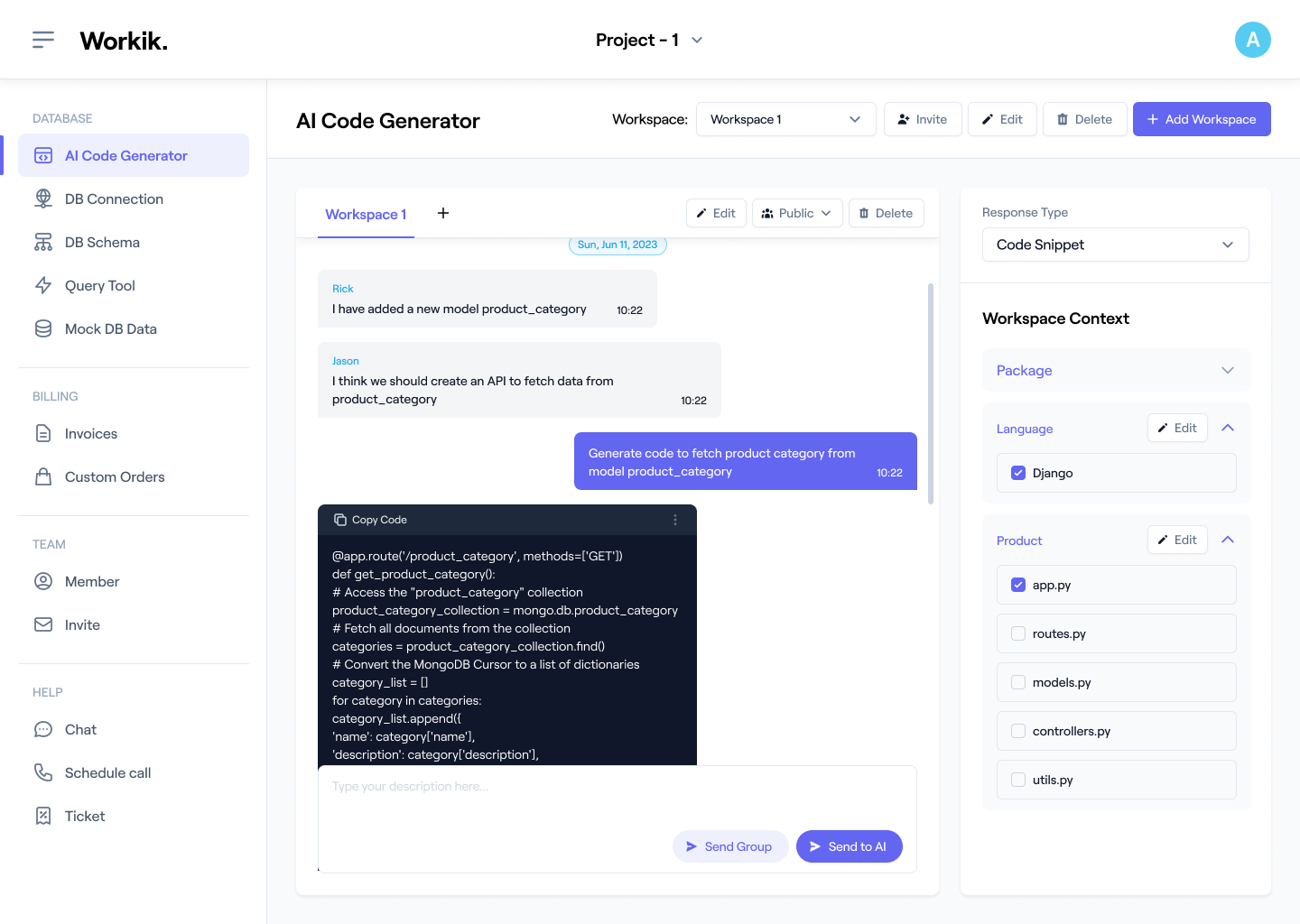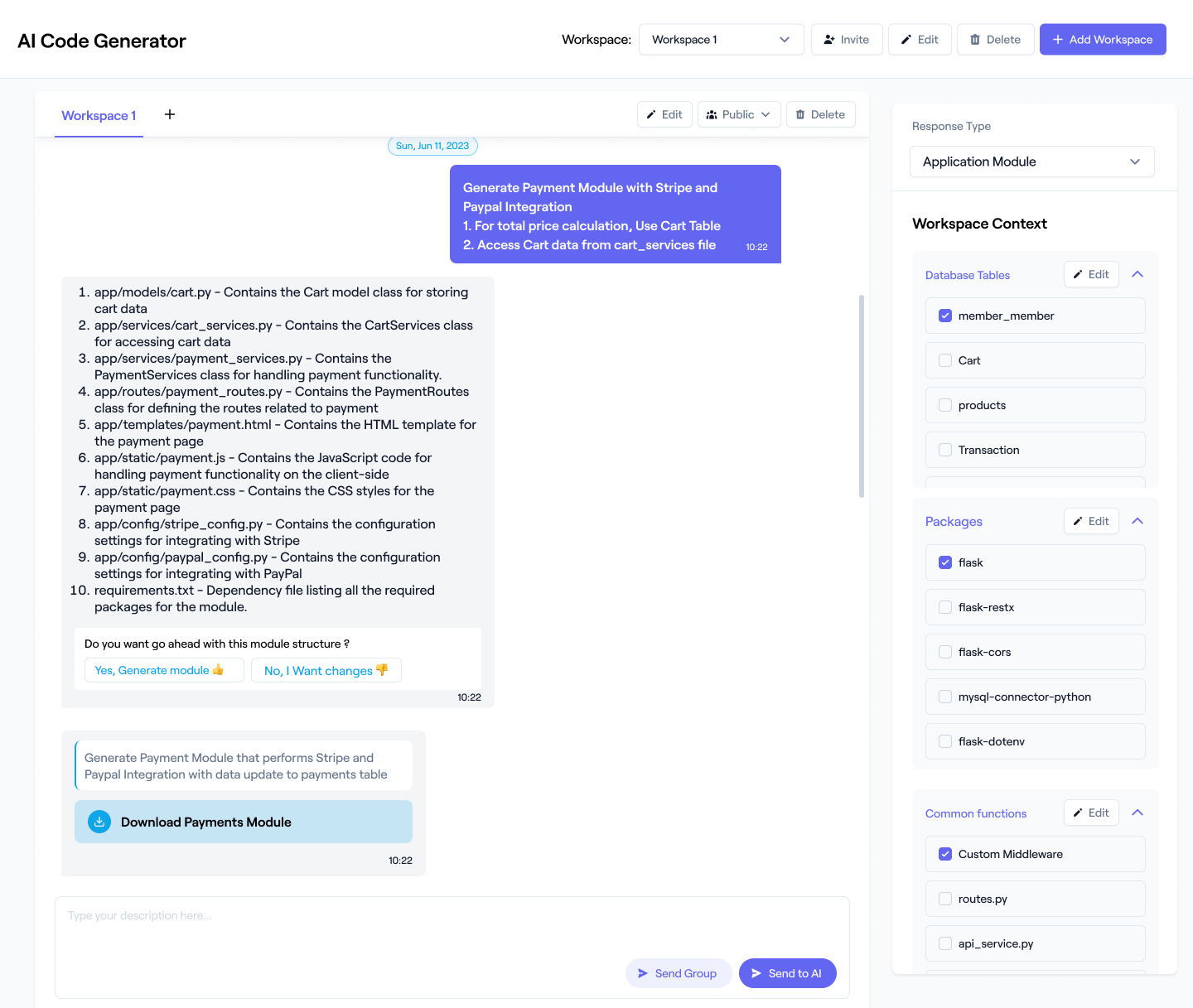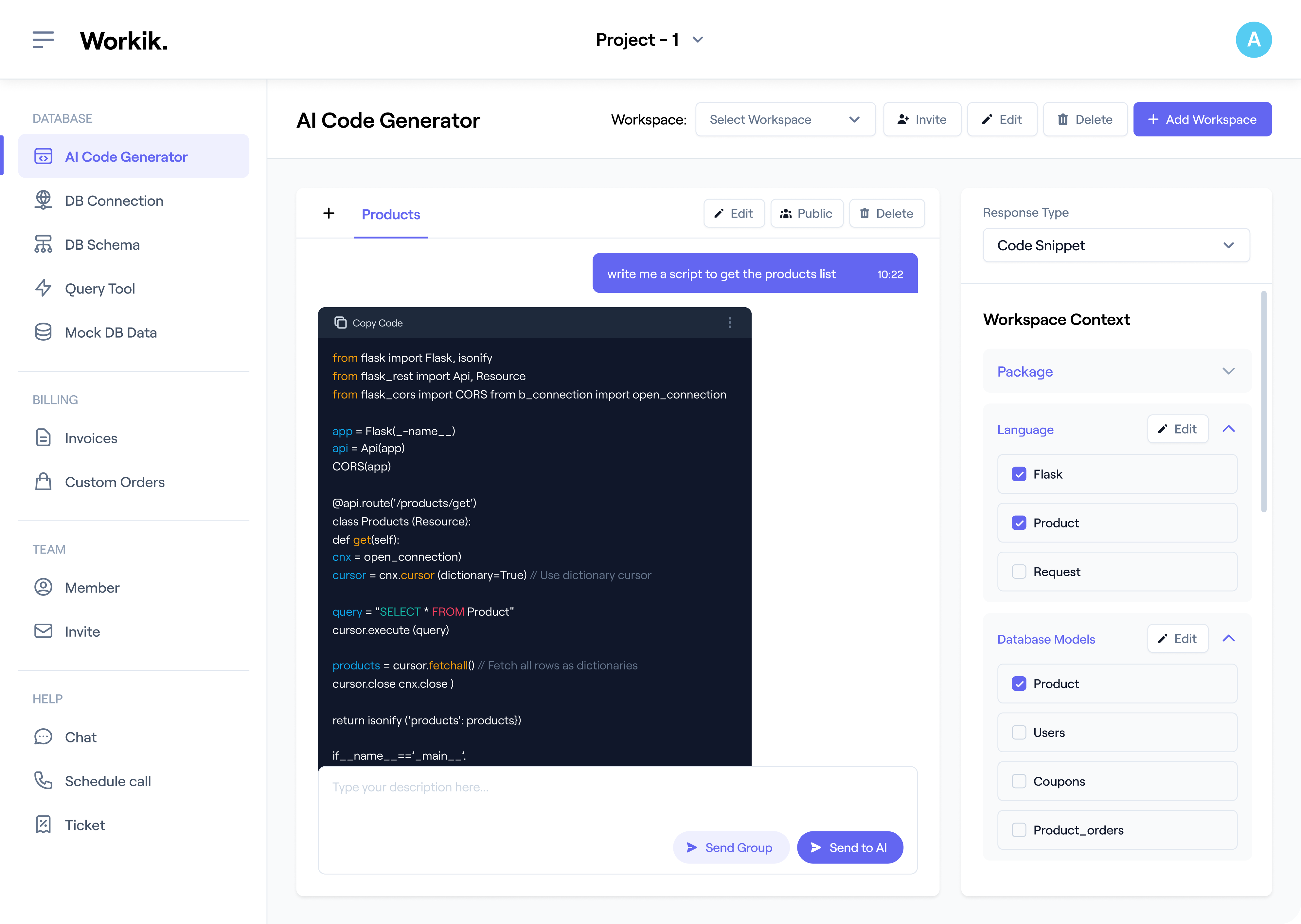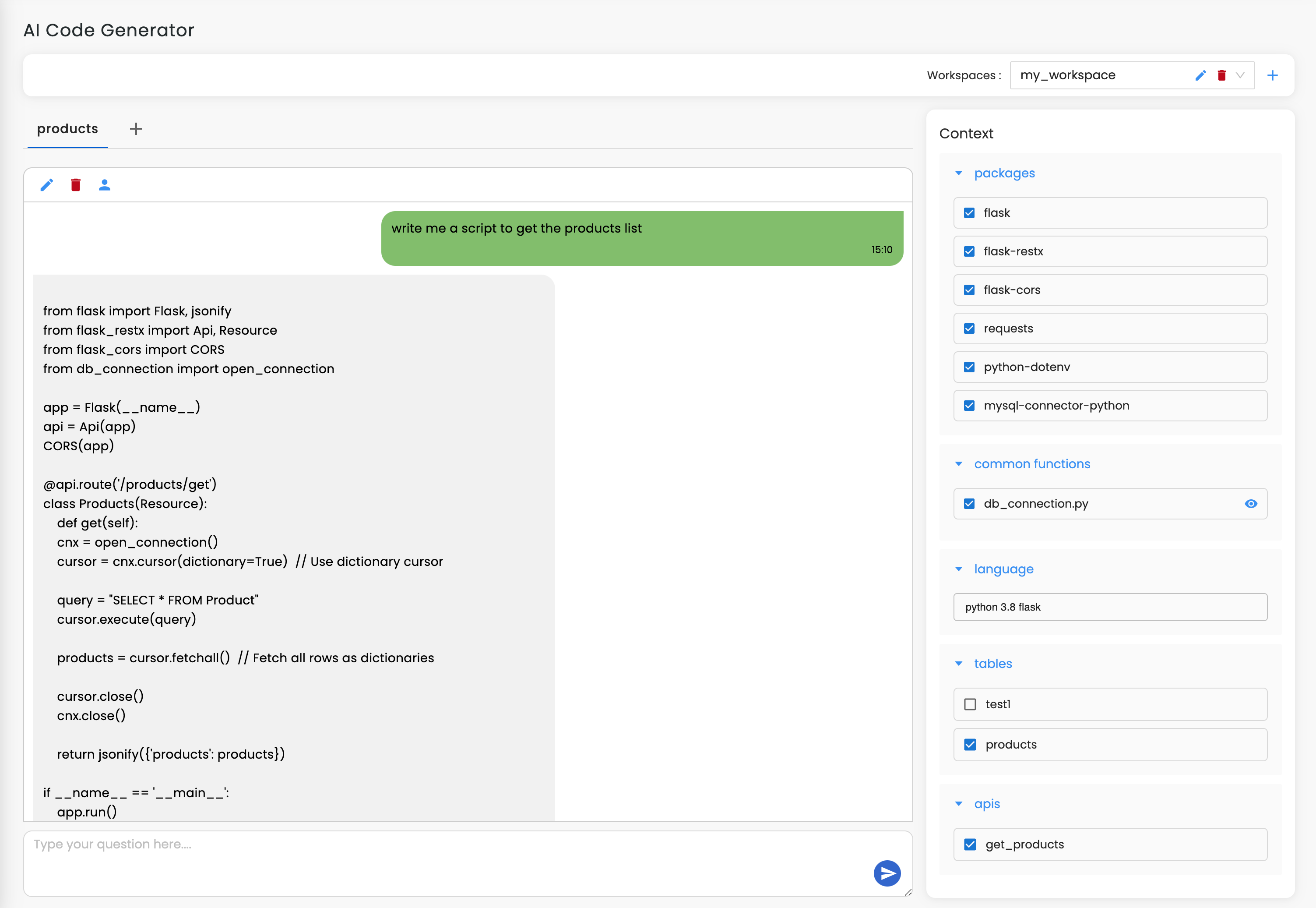
Join our community to see how developers are using Workik AI everyday.
Features

Instant UI and Layout
AI can generate complex WPF and UWP layouts with proper alignment, grids, responsive design, and more.

Automate MVVM Binding
Use AI for MVVM data binding, ensuring correct binding paths, commands, and validations for Prism or ReactiveUI.

Cross-Platform XAML Generation
Generate shared XAML for platforms like Xamarin.Forms and MAUI, maintaining consistency across operating systems.

Create Adaptive Layouts
AI adjusts layouts for different screen resolutions, ensuring responsive design across desktop, mobile, and tablet interfaces.
How it works
Create a Workik account and set up your XAML project by selecting WPF, UWP, or Xamarin.Forms.
Integrate design repositories from GitHub, GitLab, or Bitbucket, and input layout and design elements like buttons, images, or containers (Grid, StackPanel) to customize AI-generated XAML.
Use AI to generate, debug, and test XAML with styles, templates, data bindings, and more. Seamlessly integrate it with your C# logic for events, MVVM, and responsive design.
Invite your team to Workik for seamless collaboration and real-time feedbacks. Use automation pipelines to streamline routine tasks like testing and deployment.


Expand


Expand


Expand


Expand


Expand


Expand


Expand


TESTIMONIALS
Real Stories, Real Results with Workik
I easily created dynamic, responsive UIs for WPF apps with Workik’s XAML generator. No manual XML hassle!

Michael Davis
UI Developer
Workik’s XAML generator perfectly crafted form layouts. Ideal for complex data-binding scenarios.

Sonia Shelling
Software Engineer
Generated high-quality XAML for mobile-friendly designs in minutes. Workik AI is a massive productivity boost.

Brian Mitchell
Frontend Developer
What are the popular use cases of Workik's AI XAML Code Generator?


Popular use cases of Workik's AI for XAML development include, but are not limited to:
* Generate responsive WPF or UWP application layouts using XAML, reducing time spent on UI design.
* Automate data bindings in XAML, such as connecting views with ViewModels in MVVM architecture, for seamless data flow.
* Quickly create reusable components like ControlTemplates and DataTemplates for complex UIs.
* Build custom styles and resources for a consistent look and feel across WPF or Xamarin.Forms applications.
* Auto-generate animations and transitions between UI elements in XAML for improved user experiences.
What kind of contexts can I add in Workik's AI-powered XAML code generator?


Adding context enhances the accuracy of the AI, tailoring output to your specific project needs. For XAML, you can:
* Define the platform you're working with (WPF, UWP, or Xamarin.Forms) to get optimized XAML output.
* Upload your ViewModel or Model classes so the AI can accurately bind data to UI elements.
* Provide existing resource dictionaries or control templates to ensure the AI maintains design consistency.
* Specify libraries like Prism, MVVM Light, or ReactiveUI for AI to integrate into your XAML code structure.
How does Workik AI assist with creating reusable XAML components?


For creating reusable XAML components, Workik AI helps you:
* Auto-generate UserControls and CustomControls for reusable UI elements.
* Create ControlTemplates and DataTemplates for consistent visual styling across applications.
* Generate ResourceDictionaries that centralize styles, colors, and assets for easy reuse and maintainability.
How can Workik AI assist with complex XAML bindings?


Workik AI automates two-way or one-way XAML bindings between UI and ViewModel properties, simplifying configurations with INotifyPropertyChanged and ObservableCollection for dynamic updates. It also recommends optimal use of IValueConverter for custom logic.
Can Workik AI help with optimizing XAML performance in WPF/UWP applications?


Yes, Workik AI optimizes by reducing nested layouts (e.g., StackPanels), enhancing rendering speed, and suggesting virtualization techniques like VirtualizingStackPanel for handling large datasets efficiently. It also helps streamline resource-heavy components like DataTemplates.
Can Workik AI assist with debugging XAML errors?


Absolutely. Workik AI detects and resolves common XAML issues like incorrect bindings or missing DataContexts. It offers suggestions such as IDataErrorInfo for better validation and runtime error prevention.
How does Workik AI support multi-platform development with XAML in Xamarin.Forms?


Workik AI generates platform-specific code for Xamarin.Forms and offers guidance on using adaptive layouts and Device.OnPlatform for cross-platform optimization. It ensures consistency while enabling platform-specific UI customization.
How can Workik AI assist with animations and visual states in XAML?


Workik AI automates Storyboard creation for smooth animations and optimizes VisualStateManager usage for responsive UI across devices. It also helps fine-tune animations for better performance on resource-limited devices.
Generate Code For Free

XAML Question and Answer
XAML (eXtensible Application Markup Language) is a declarative language used primarily for defining user interfaces in .NET applications, particularly in technologies like WPF (Windows Presentation Foundation), UWP (Universal Windows Platform), and Xamarin.Forms. XAML enables developers to create rich UI elements, manage layouts, and bind data using a markup-based approach, simplifying the process of building visually compelling and interactive applications.
Popular frameworks and libraries used in XAML:
UI Frameworks:
WPF, UWP, Xamarin.Forms
MVVM Frameworks:
Prism, MVVM Light, ReactiveUI
Data Binding:
INotifyPropertyChanged, IValueConverter, Binding
Styling & Templating:
ControlTemplate, DataTemplate, ResourceDictionary
UI Controls:
Telerik UI for WPF, Syncfusion UI, MahApps.Metro
Dependency Injection:
Microsoft.Extensions.DependencyInjection, Autofac
Navigation:
Prism Navigation, Xamarin Shell
Popular use cases of XAML include:
Desktop Application Development:
XAML is widely used in WPF and UWP applications for creating sophisticated, responsive desktop applications.
Cross-Platform Mobile Apps:
With Xamarin.Forms, XAML is used to develop UI elements for mobile applications that work across iOS and Android platforms.
Data Binding and MVVM Architecture:
XAML excels at data binding, particularly with the Model-View-ViewModel (MVVM) design pattern, enabling the separation of UI logic from business logic.
Custom Controls and Templates:
Developers use XAML to create reusable custom controls and define complex UI layouts with templates.
Enterprise Software Solutions:
Used in building high-performance, scalable applications for enterprise-grade software on Windows platforms.
Career opportunities and technical roles available for XAML developers include WPF Developer, UWP Developer, Xamarin.Forms Developer, UI/UX Designer for .NET Applications, Software Engineer, Full-Stack Developer with .NET/XAML Expertise, and Mobile App Developer (using Xamarin).
Workik AI provides extensive XAML assistance, including:
1. Code Generation:
Generates XAML code for building user interfaces, defining layouts, and creating custom controls.
2. Debugging:
Identifies issues in XAML files and offers suggestions to resolve layout and binding errors.
3. Optimization:
Provides performance enhancements and best practices for managing UI rendering and resource utilization in XAML applications.
4. UI Automation:
Automates repetitive UI design tasks, such as creating templates, styles, and resource dictionaries.
5. Refactoring:
Recommends improvements for cleaner, more maintainable XAML code, especially in large applications.
6. Binding Assistance:
Helps with setting up and troubleshooting data bindings, particularly in MVVM architectures.
7. Cross-Platform Support:
Aids in generating XAML code for cross-platform mobile development with Xamarin.Forms.
8. Framework Integration:
Assists with the integration of popular XAML frameworks like Prism or Material Design in XAML for enhanced UI/UX features.
9. Styling and Animation:
Helps create dynamic animations, transitions, and apply consistent styles across the application using XAML.
Explore more on Workik
Get in touch
Don't miss any updates of our product.
© Workik Inc. 2026 All rights reserved.

